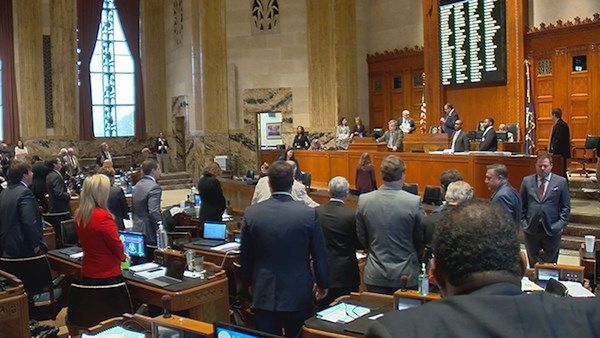Jim Beam column:Legislative pay bill surfaces
Published 6:45 am Saturday, March 25, 2023

- Members of the Louisiana House of Representatives will get first crack at a proposed pay increase for lawmakers. An effort in 2008 died with a governor's veto. Here are the details from then and now.(Photo courtesy of WVUE-Fox 8 television):
Louisiana legislators came awfully close to more than doubling their pay 15 years ago, and there will be another effort to raise their salaries at the session beginning April 10. Former Gov. Bobby Jindal shot their plans down with a veto in 2008 after saying he wouldn’t do it if the raises were approved.
State Rep. Joe Marino, an independent from Gretna, has filed House Bill 149 that would increase legislators’ salaries from $16,800 annually to $60,000. The salary would be adjusted by the cost of living every four years beginning in 2028. The $16,800 was approved in 1980, 43 years ago, and Marino said $60,000 has approximately the same buying power in 2023 that the $16,800 did in 1980.
Marino, who is not seeking re-election , told the Louisiana Illuminator he is bringing the bill because he feels that it is cost-prohibitive to be a legislator. He is an attorney and echoed the sentiments of many other lawmakers when he said he has had to make financial sacrifices in order to make his legislative schedule work.
Trending
“If we make no changes in what we pay a legislator, we’re going to wind up with a Legislature that’s going to be comprised of either wealthy individuals or retired individuals,” Marino said. “That’s not going to give us the kind of diversity that we should want in our elected officials.”
Rep. Mandie Landry, a Democrat from New Orleans, and also an attorney, said young people see the world differently and would provide a broader spectrum of people in the Legislature.
“ … They’re thinking about the far off future. They think a lot more about the environment. They’re closer to education. They may never be able to own a house,” Landry said.
Former state Sen. Ann Duplessis, D-New Orleans, sponsored the 2008 pay raise bill that Jindal vetoed. The original bill was going to raise legislative pay from $16,800 to $70,000 and increase expenses from $500 per month to $1,500 in the House and $3,000 in the Senate.
The legislation was amended to instead give legislators 30 percent of the salaries paid to members of Congress. It would also have been adjusted annually with the cost of living. That didn’t go over well, and it was changed again to raise legislative salaries from $16,800 to $37,500 a year. Lawmakers would have continued to receive a $6,000 unvouchered expense allowance counted as income and $143 in daily per diem payments each day they were in session.
A Senate committee approved the bill in early May of 2008, but it stayed on the calendar until the Senate approved it 20-16 on June 10. It then moved with lightning speed through a House committee and on to the full House.
Trending
The House on June 13, 2008, voted 56-45 for the pay increase. Jindal said on June 24 it would be politically expedient to veto the bill, but that could trigger a backlash from legislators that could doom his health care, workforce development and education plans.
“Everyone knows it would be in my own political interest to veto this bill,” he said. “I’d probably be the most popular governor in modern polling history if I did that, but I don’t want to give the legislators any excuse to slow down reforms.”
Jindal in his veto message said promising not to veto the bill was a mistake on his part. He said the doubling of legislative pay was excessive and he opposed future automatic pay increases without subsequent legislative action.
“Pay raise on everyone’s lips,” I said in a June 12, 2008, column.
Then-Sen. Robert Adley, R-Bossier City, said, “I knew his (Jindal’s) decision would be based on what’s in the best interest of his politics.”
Sen. Damon Baldone, D-Houma, said, “When someone gives you his word and takes it back, you lose a lot of respect.”
Others had a completely different view. One woman I spoke with said she felt as though a weight had been lifted off her chest. Another said the time wasn’t right with people suffering from high gasoline prices and the increasing costs of everything else.
Another opponent said the legislative salary after the $37,500 raise would have been more than most Louisiana citizens earned in a year. The per capita income at that time was about $31,000. The Illuminator reported that the median household income in Louisiana at this time is about $53,000.
Today’s economy isn’t in great shape again, but some legislative pay increase after 43 years may be in order. Legislators and the rest of us can be sure the voters are going to let us know how they feel about that.





